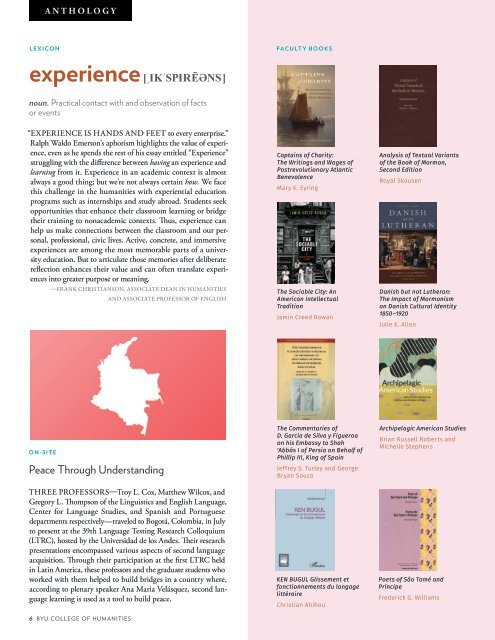Fall 2017
You also want an ePaper? Increase the reach of your titles
YUMPU automatically turns print PDFs into web optimized ePapers that Google loves.
ANTHOLOGY<br />
LEXICON<br />
FACULT Y BOOKS<br />
experience [ˌIKˈSPIRĒƏNS]<br />
noun. Practical contact with and observation of facts<br />
or events<br />
“EXPERIENCE IS HANDS AND FEET to every enterprise.”<br />
Ralph Waldo Emerson’s aphorism highlights the value of experience,<br />
even as he spends the rest of his essay entitled “Experience”<br />
struggling with the difference between having an experience and<br />
learning from it. Experience in an academic context is almost<br />
always a good thing; but we’re not always certain how. We face<br />
this challenge in the humanities with experiential education<br />
programs such as internships and study abroad. Students seek<br />
opportunities that enhance their classroom learning or bridge<br />
their training to nonacademic contexts. Thus, experience can<br />
help us make connections between the classroom and our personal,<br />
professional, civic lives. Active, concrete, and immersive<br />
experiences are among the most memorable parts of a university<br />
education. But to articulate those memories after deliberate<br />
reflection enhances their value and can often translate experiences<br />
into greater purpose or meaning.<br />
—FRANK CHRISTIANSON, ASSOCIATE DEAN IN HUMANITIES<br />
AND ASSOCIATE PROFESSOR OF ENGLISH<br />
Captains of Charity:<br />
The Writings and Wages of<br />
Postrevolutionary Atlantic<br />
Benevolence<br />
Mary K. Eyring<br />
The Sociable City: An<br />
American Intellectual<br />
Tradition<br />
Jamin Creed Rowan<br />
Analysis of Textual Variants<br />
of the Book of Mormon,<br />
Second Edition<br />
Royal Skousen<br />
Danish but not Lutheran:<br />
The Impact of Mormonism<br />
on Danish Cultural Identity<br />
1850–1920<br />
Julie K. Allen<br />
ON-SITE<br />
Peace Through Understanding<br />
THREE PROFESSORS—Troy L. Cox, Matthew Wilcox, and<br />
Gregory L. Thompson of the Linguistics and English Language,<br />
Center for Language Studies, and Spanish and Portuguese<br />
departments respectively—traveled to Bogotá, Colombia, in July<br />
to present at the 39th Language Testing Research Colloquium<br />
(LTRC), hosted by the Universidad de los Andes. Their research<br />
presentations encompassed various aspects of second language<br />
acquisition. Through their participation at the first LTRC held<br />
in Latin America, these professors and the graduate students who<br />
worked with them helped to build bridges in a country where,<br />
according to plenary speaker Ana Maria Velásquez, second language<br />
learning is used as a tool to build peace.<br />
6 BYU COLLEGE OF HUMANITIES<br />
The Commentaries of<br />
D. García de Silva y Figueroa<br />
on his Embassy to Shah<br />
'Abbās I of Persia on Behalf of<br />
Phillip III, King of Spain<br />
Jeffrey S. Turley and George<br />
Bryan Souza<br />
KEN BUGUL Glissement et<br />
fonctionnements du langage<br />
littéraire<br />
Christian Ahihou<br />
Archipelagic American Studies<br />
Brian Russell Roberts and<br />
Michelle Stephens<br />
Poets of São Tomé and<br />
Principe<br />
Frederick G. Williams


